-
Rootie KazootieA Novel
“What do I want you to do? You really want to know? I’ll tell you. Just look me in the eye and tell me one thing. Just do it. Tell me whether you and Cynthia have made love. Tell me. Go on.”
“The answer is no.”
“You swear?”
“I swear.”
“I believe you,” she said quietly, and for a moment Richard thought it was over until she turned around and screamed at him, “THEN WHY DON’T YOU MAKE LOVE WITH ME?”
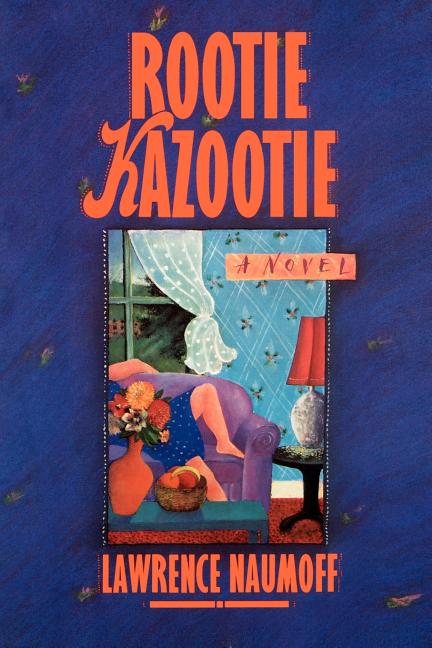 Rootie Kazootie : A Novel
Rootie Kazootie : A Novel -
Rootie KazootieA Novel
He and Cynthia stumbled toward the other side of the room as the entire front end of the tractor broke through the splintered door and entered the house. As it did, the muffler, coming out above the hood, hit the top of the doorway and snapped off.
Oh, help, Caroline thought.
“HOLY SHIT,” Richard screamed.
“STOP HER,” Cynthia yelled at him.
It was an unsettling sight, to put it mildly, for Cynthia to see the front end of a 6,000-pound tractor rolling across her Oriental carpet, the very carpet she had chosen so that all the colors complemented each other and the old pine floor, the deep earth-brown and tan and the reds and yellows, and now, a green, wheezing and roaring monster with oil dripping sat on that rug.
 Rootie Kazootie : A Novel
Rootie Kazootie : A Novel -
Rootie KazootieA Novel
“It’s just that I hate being alone,” Caroline said. “I hate being poor, as well, and damn it all, here I go again back where I started. I hate going backwards. It takes so much out of you to get where you want to be. One person can’t do it nowadays, you know? It’s just too hard. You’ve got to have someone else. That’s what makes me so mad about that thing he’s run off with. She doesn’t need him any more than we need another hot day this summer. You know? She just doesn’t.”
 Rootie Kazootie : A Novel
Rootie Kazootie : A Novel
-
Green the Witch-Hazel WoodPoemsFrom"Likewise"
The pond is like a mackerel skin tonight,
the mackerel like a beaded evening bag.
This is like that, that is like this, oh,
let's call the whole thing off and take it straight:
nothing is like anything else.
Even the parrot and the apish ape
mirror, mimic and do like — unmatched.
To begin: algae, abalone, alewife —
each the spitting image of itself.
Likewise beetles (potato, scarab and whirligig.)
Nothing even comes close to barrel cactus,
nothing is more original than a bog,
more rare than the cougar and crane —
save all the above named.
I've never seen anything like it — dustbowls,
deer, the descent of man and estuaries,
flakes of snow (no two like) fire,
flax, gannets and gulls.
Honeybees and the Hoover Dam
are unique -- there is nothing like a dam.
Ditto inbreeding, ice ages, industrialization,
joshua trees, lagoons and the law
that to liken a lichen is tautological.
Indeed, the rule of diminishing simile holds
that all of these are idiosyncracies:
the Leakeys, legumes, maize, marsupials and moose.
Virtually nothing is extraneous here —
not orchids, ooze, pampas nor peat.
This is the world of plenitude and power —
every bit of it out of this world:
the rain and rattlers, sperm, swamps and swans.
As now we inch toward an end — vectors
and a winter that figures to be like no other,
say the selfsame earth is to your liking,
and let us continue — yeast, yuccas, zoons,
all things like, beyond compare.
 Green the Witch-Hazel Wood : Poems
Green the Witch-Hazel Wood : Poems -
Green the Witch-Hazel WoodPoemsFrom"Quiet Woman"
When Quiet Woman comes,
she fills my ears
with morning glories.
Morning glories
grow out my ears –
big blue trumpets
in those soft canals.
My hearing is better
than a geezer’s,
but the dog howls
when the telephone rings.
I do not answer
with a flower in my ear.
I hear only wind
and the scuttle of trinkets
she tosses my way:
garters, crosses, scars,
glimmers and brass.
 Green the Witch-Hazel Wood : Poems
Green the Witch-Hazel Wood : Poems -
Green the Witch-Hazel WoodPoemsFrom"Weird How the Word Works"
This little line got tongue-tied.
This little line is dumb.
This little line is cockeyed.
This… miracle! A blossom in the stream –
gibble gabble jaw jabber a priori blossom.
Weird how the word works.
BLOSSOM. Brainstem, blowsy,
two syllables, two lips oratorical.
Say Bloss some. Blah, blah, sum.
The blossom drums da Dum within the seed.
Hush, petal ear. Hear the earth’s ambition
creak – orchard to orchard.
Nova, Nova. It is a blooming universe.
Here is a line that opens like a starfish,
like a starfish eating sea blossoms,
embracing the blossoms and slowly,
deliciously, building the body of the world.
 Green the Witch-Hazel Wood : Poems
Green the Witch-Hazel Wood : Poems
Selected Works
read more >-
ArabesquesA Novel
The intimate places of his father’s body were now within his reach, turned over to the touch of his fingers: his father who had never embraced him as a child. First he would touch his earlobes, to move them out of the way for the scissors, which had been taken out of the mother-of-pearl damascene box. Then he would take the nose between his thumb and forefinger, and give it a slight lift so as to shave above the upper lip. And the more the cancer gnawed away at the liver and the body grew limp, the more it opened to him, replete with its disappointments, sated with its tribulations. They would sit together in silence, the father and he, the youngest of his sons.
 Arabesques : A Novel
Arabesques : A Novel -
ArabesquesA Novel
As the Jews’ army was making its way along the road winding up to Deir El-Kasi, Abu Shacker was looting its houses. The inhabitants of Deir El-Kasi had not waited for the convoy to arrive. They were already across the border. And Abu Shacker, who had felt their outstretched arm upon his back in the days of the Arab Rebellion, now entered the home of Mahmood El-Ibraheem, who had been the regional commander in the days of the rebellion. The gate to the courtyard was open, as if the inhabitants of the house had just stepped out for a moment to visit a neighbor. Abu Shacker entered through the gate and shut it behind him as if he were trying to preserve, if only for a moment, the vanishing past, and he stood in the courtyard, in the very spot where he had stood ten years before.
 Arabesques : A Novel
Arabesques : A Novel -
ArabesquesA Novel
Imagine, then, a British soldier plummeting from the roof high above the third floor down into our courtyard, landing in a puddle of water from the early-December rain. The water splashes on the gas mask over the face of a boy playing by the puddle and blurs his vision. But first imagine a shot, just a single round from among the hundreds that had begun with the gray dawn, whose trajectory crisscrossed the skies of Haifa, in the warp and woof of the war between Jews and Arabs. Then imagine this one bullet hitting the soldier standing watch on the roof. He falls, and behind him the sharp spire of St. John’s Church rises toward the brightening sky. The boy, who is about seven, freezes to the spot where the thud has caught him trying to frighten a neighbor’s daughter with the gas mask he has bought from a peddler of military equipment. Now imagine the long second that passes between the thud and the scream: the silence that falls on the courtyard and is cast over the body, and then is lifted by the scream, which hangs in the air until the silence wraps itself again around the still body.
 Arabesques : A Novel
Arabesques : A Novel
Selected Works
read more >-
Father MustStoriesFrom"Satellite Dish"
I like a crusty bread. Last spring, when the man who sold my son the satellite dish told him that the signal wasn’t coming in good because of the big old elm tree across the road by the house, that it was getting in the way of the reception, everyone—my son, my daughter-in-law, my grandsons, and then, because everyone else was, even the man—looked at me. I loved that tree. It was always there. It would always make me feel good to walk in the yard through its patterned shadow on my way into the house. But then, across the road, there was the satellite dish. I said they could chop the tree down but I wanted every bit of wood from it cut and stacked in a pile by itself. And though I hadn’t done it for years, since we’d got an electric stove and a furnace, I started back using the old wood stove, which we’d left in the kitchen mostly for looks. It’s better to cook bread in a wood stove anyway. You can tell the difference not just in the crust but also in taste.
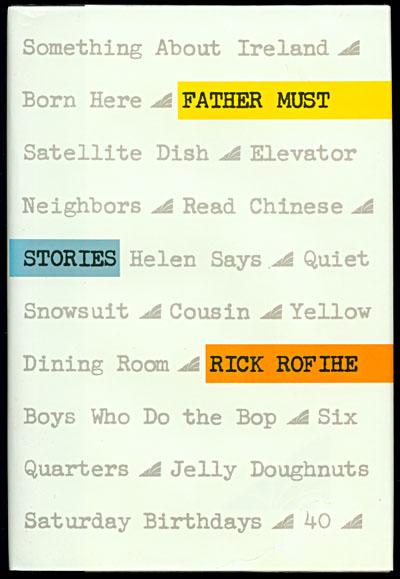 Father Must : Stories
Father Must : Stories -
Father MustStoriesFrom"Read Chinese"
… sometimes in the coffee and pastry shops here in Chinatown I mimic the words I hear, but very softly. If you do it, don’t get too loud, because then it sounds like an echo, and people start looking around.
Chinese, spoken, is such a pleasing language. So many tones – it’s like singing. Since I don’t know what I’m saying, I never try to use those words when it comes my turn to order. I say, “One of those, one of those, one of those, one of those, and one of those. And one of those.” All in one tone. Not so pleasing.
 Father Must : Stories
Father Must : Stories -
Father MustStoriesFrom"Jelly Doughnuts"
Simmi’s only been in New York three weeks, but the second night she was here Buck took her to a coffee place he knew, and now Simmi makes sure he takes her there every night. Maybe if there’s somewhere else they have to be, something one of them has to do, they’ll skip a night, but they couldn’t miss too many, because then it would become something they used to do. And that would make it part of the past. And what she thinks is part of the past Simmi won’t consider.
 Father Must : Stories
Father Must : Stories
Selected Works
read more >-
The Late Summer Passion of A Woman of MindA Novel
It was true that Eva’s male colleagues had by now ceased to joke among themselves that a hopeless crush on Professor Mueller ought to be included among the requirements for the major in philosophy, but this was not because the students no longer fell in love with her. They did, at a rate which had of course slackened over the years but was still not inconsiderable. It was an irony—of course quite lost on Eva, who was steadfastly oblivious to the dramas in which she figured—that many who sat raptly listening to their professor’s lectures on the “futility of the passions,” on the need to transform the passive emotions directed towards objects and people outside ourselves into the active emotions of the intellect, were swollen with an advanced case of that same passive desire whose elimination was being eloquently, even passionately, urged upon them.
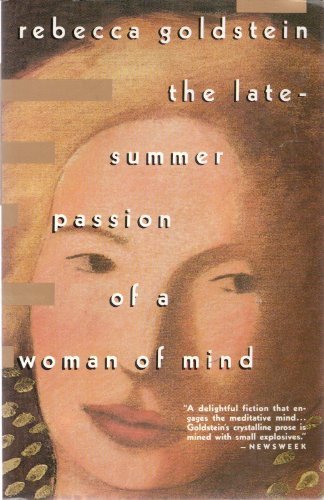 The Late Summer Passion of A Woman of Mind : A Novel
The Late Summer Passion of A Woman of Mind : A Novel -
The Late Summer Passion of A Woman of MindA Novel
The hands of the women lingered over their tumescent bellies. A girl no more than fifteen sat beside Eva. She was obviously in an advanced state. Her skinny, childish legs in cheap sky-blue summer pants dangled down from her engorged womb. Eva stared in disbelief at the bulge of it. The thing quivered, and the girl giggled at Eva, making a motion of swimming. Eva fought down the surge of acrid sickness, averting her eyes from the sight.
She sat all afternoon, as women came and went. There was no receptionist; patients were called in by the doctor himself.
 The Late Summer Passion of A Woman of Mind : A Novel
The Late Summer Passion of A Woman of Mind : A Novel -
The Late Summer Passion of A Woman of MindA Novel
It was in this first book that Eva came upon a reference to Joseph Goebbels’ children. Gisevius made a passing, cynical reference to the presence of the Goebbels children at one of those fêtes the Nazis were such masters at creating, Hitler’s fiftieth birthday party perhaps. “There were the inevitable Goebbels children, trotted out once more for display.” Yes, she could remember them. There had been six of them. They had been pointed out to her once, at some sort of celebration, very very large. Perhaps it had even been that massive birthday party for Hitler! They had been standing on the podium, beside their mama and papa, dressed all in white. She could not really remember how their famous papa had looked. She had only stared at the beautiful children, the six shining specimens of Aryan perfection.
“Look,” Mama had said, “look at how beautiful and good they are.”
 The Late Summer Passion of A Woman of Mind : A Novel
The Late Summer Passion of A Woman of Mind : A Novel
Selected Works
read more >Stanley Crouch
-
Notes of a Hanging JudgeEssays and Reviews, 1979-1989From"The Electric Guardian Angel"
Breaker, trick rider, picador, and the heavyweight ring’s fastest jockey, Ali has made ring time canter and canter, bow, leap over giant bushes, and move so much in his own terms that time became mutual with his grace, Truly the Professor of Boxing, he elasticized his profession, made daring and cunning and mystery part of the craft. Did we ever wonder as much during anybody else’s fights what the champ was thinking?
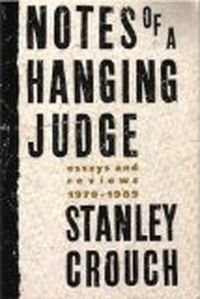 Notes of a Hanging Judge : Essays and Reviews, 1979-1989
Notes of a Hanging Judge : Essays and Reviews, 1979-1989 -
Notes of a Hanging JudgeEssays and Reviews, 1979-1989From"Animated Coon Show"
As with any ethnic group, there has always been an element of self-satire in most black American humor, a touch of the minstrel. But the irony of the grotesque reduction to sambo stereotype by white performers in blackface is that its popularity owed as much to the vitality it distorted as it did to the appeal of racism. Consequently, when cartoon characters are based on actual black entertainers like Fats Waller, the question becomes what it has been since Pigmeat Markham, Moms Mabley, Flip Wilson, or, for that matter, The Jeffersons. Where does the stereotype stop and the fun begin? Where do we draw the line between vernacular humor and cinematic slander? During the years when these cartoons were made, the shuffling, giggling, lazy, and stupid darkie was supposed to have represented black authenticity to white Americans. Maybe yes, maybe no. What, for instance, did white Americans think when they watched newsreels showing handsome Joe Louis whipping white men with very consistent regularity on programs that also featured Negroes running from sheets in films or personifying incompetence and abandon in cartoons? Perhaps it was simply more convenient to accept the stereotypes.
 Notes of a Hanging Judge : Essays and Reviews, 1979-1989
Notes of a Hanging Judge : Essays and Reviews, 1979-1989 -
Notes of a Hanging JudgeEssays and Reviews, 1979-1989From"Man in the Mirror"
The American dream is actually the idea that an identity can be improvised and can function socially if it doesn’t intrude upon the freedom of anyone else. With that freedom comes eccentric behavior as well as the upward mobility resulting from talent, discipline, and good fortune—and the downward mobility observed in some of those who inhabit the skid rows of this country because they prefer the world of poverty and alcoholism to the middle-, upper-middle-, or upper-class backgrounds they grew up in. As one bum who had obviously seen better days said to a waiter as he was being ushered out of the now defunct Tin Palace for panhandling, “People come from all over the world to be bums on the Bowery. Why should I deny myself that right?”
 Notes of a Hanging Judge : Essays and Reviews, 1979-1989
Notes of a Hanging Judge : Essays and Reviews, 1979-1989
Selected Works
read more >-
Reasonable CreaturesEssays on Women and Feminism
For me, to be a feminist is to answer the question “Are women human?” with a yes. It is not about whether women are better than, worse than or identical with men. And it’s certainly not about trading personal liberty – abortion, divorce, sexual self-expression—for social protection as wives and mothers, as pro-life feminists propose. It’s about justice, fairness and access to the broad range of human experience. It’s about women consulting their own well-being and being judged as individuals rather than as members of a class with one personality, one social function, one road to happiness. It’s about women having intrinsic value as persons rather than contingent value as a means to an end for others: fetuses, children, “the family,” men.
 Reasonable Creatures : Essays on Women and Feminism
Reasonable Creatures : Essays on Women and Feminism -
Reasonable CreaturesEssays on Women and FeminismFrom"Marooned on Gilligan’s Island"
We should not be surprised that motherhood does not produce uniform beliefs and behaviors: It is, after all, not a job; it has no standard of admission, and almost nobody gets fired. Motherhood is open to any woman who can have a baby or adopt one. Not to be a mother is a decision; becoming one requires merely that a woman accede, perhaps only for as long as it takes to get pregnant, to thousands of years of cumulative social pressure. After that, she’s on her own; she can soothe her child’s nightmares or let him cry in the dark. Nothing intrinsic to child-raising will tell her what is the better choice for her child…
 Reasonable Creatures : Essays on Women and Feminism
Reasonable Creatures : Essays on Women and Feminism -
Reasonable CreaturesEssays on Women and FeminismFrom"Our Right-to-Lifer: The Mind of an Antiabortionist"
I had two longish talks with Ramon, punctuated by his calling out “Abortion is murder!” every few minutes as another woman brushed past him on her way into the building. They were not very satisfying conversations. For one thing, Ramon is evasive about facts: his last name, for instance, and his nationality. When I asked him if he had voted in the last election, he told me he was not a U.S. citizen but would not tell me which country he was from, except that it was in Latin America, and he pulled out a plastic rosary. “The Blessed Mother sent me here.” What did his parents think of what he was doing? “The Blessed Mother and Jesus Christ are my parents.”
 Reasonable Creatures : Essays on Women and Feminism
Reasonable Creatures : Essays on Women and Feminism
Selected Works
read more >-
Lost in TranslationA Life in a New Language
We don’t have the remotest idea of what we might find or do there, but America—Canada in our minds is automatically subsumed under that category—has for us the old fabulous associations: streets paved with gold, the goose that laid the golden egg. There is also that book about Canada from the war. And, my father reminds my mother, whose impulses really draw her toward Israel, in Canada there is no war, and there never will be. Canada is the land of peace. In Israel, there’s a constant danger of war, and they take even girls into the army. Does she want her daughters to end up on a battlefield? Does she herself want to go through a war again?
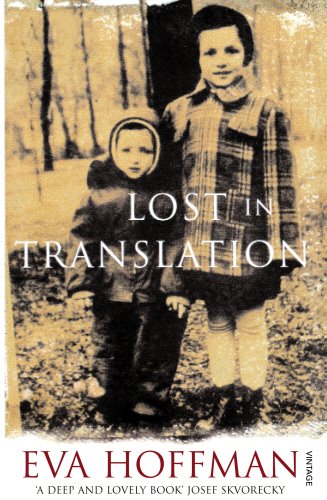 Lost in Translation : A Life in a New Language
Lost in Translation : A Life in a New Language- Print Books
- Find your local bookstore (via IndieBound)
- Powell's
- Barnes & Noble
- Alibris
- Abe Books
- E-Books
- Kobo
- Barnes & Noble
-
Lost in TranslationA Life in a New Language
But being “an immigrant,” I begin to learn, is considered a sort of location in itself—and sometimes a highly advantageous one at that. In uneventful Vancouver, I’m enough of a curiosity that I too enjoy the fifteen minutes of fame so often accorded to Eastern European exotics before they are replaced by a new batch. The local newspaper takes me up as a sort of pet, printing my picture when I give a concert at the Jewish Community Center and soliciting my views when I come back from a bus trip to the United Nations, on which I’ve been sent after winning a speech contest. They want to know my opinions of the various cities I’ve been in, and I have no hesitation about offering them. “New York is the real capital of the United States,” I readily opine. “Washington just has the government.
 Lost in Translation : A Life in a New Language
Lost in Translation : A Life in a New Language- Print Books
- Find your local bookstore (via IndieBound)
- Powell's
- Barnes & Noble
- Alibris
- Abe Books
- E-Books
- Kobo
- Barnes & Noble
-
Lost in TranslationA Life in a New Language
…I want to figure out, more urgently than before, where I belong in this America that’s made up of so many sub-Americas. I want, somehow, to give up the condition of being a foreigner. I no longer want to tell people quaint stories from the Old Country, I don’t want to be told that “exotic is erotic,” or that I have Eastern European intensity, or brooding Galician eyes. I no longer want to be propelled by immigrant chutzpah or desperado energy or usurper’s ambition. I no longer want to have the prickly, unrelenting consciousness that I’m living in the medium of a specific culture. It’s time to roll down the scrim and see the world directly, as the world. I want to reenter, through whatever Looking Glass will take me there, a state of ordinary reality.
 Lost in Translation : A Life in a New Language
Lost in Translation : A Life in a New Language- Print Books
- Find your local bookstore (via IndieBound)
- Powell's
- Barnes & Noble
- Alibris
- Abe Books
- E-Books
- Kobo
- Barnes & Noble
Selected Works
read more >-
A Feather on the Breath of GodA Novel
He could be cruel. I once saw him blow pepper in the cat’s face. He loathed that cat, a surly, untrainable tom found in the street. But he was fond of another creature we took in, an orphaned nestling sparrow. Against expectations, the bird survived and learned to fly. But, afraid that it would not know how to fend for itself outdoors, we decided to keep it. My father sometimes sat by its cage, watching the bird and cooing to it in Chinese. My mother was amused. “You see: He has more to say to that bird than to us!” The emperor and his nightingale, she called them. “The Chinese have always loved their birds.” (What none of us knew: At that very moment in China keeping pet birds had been prohibited as a bourgeois affectation, and sparrows were being exterminated as pests.)
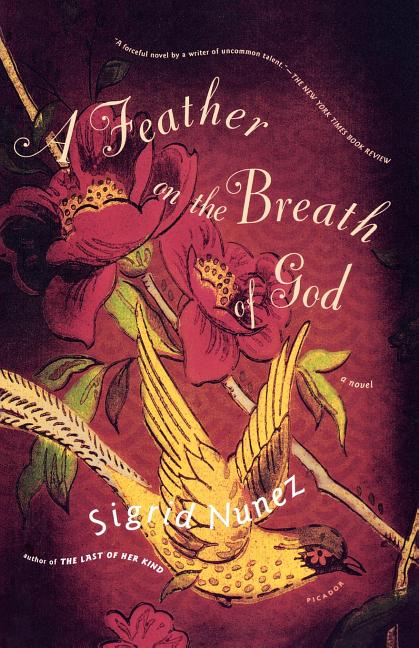 A Feather on the Breath of God : A Novel
A Feather on the Breath of God : A Novel -
A Feather on the Breath of GodA Novel
I sit on her bed watching her get ready to go out. The process of putting on her face takes a long time and is always the same, but I never tire of it. Those tempting little pots and tubes with names like desserts: Iced Mocha, Plum Passion, Peaches ‘n’ Cream. The magic mascara wand. Abracadabra: blond lashes are black. She says it helps if you keep your mouth open when putting on eye makeup. She is in her slip and stockings, the bumps of her garters standing out on her thighs. When she crosses her legs, there is the hiss of nylon against nylon. She says that European women are better at using cosmetics than American women. “American women look so cheap.” She always puts her lipstick on last, but first she rubs a dry toothbrush lightly across her lips to smooth them. I pick up the tissue she uses to blot her mouth and fit my own mouth to the imprint. The next part of her toilette I don’t like. Before pulling on her dress, to protect it from stains, she ties a scarf over her face. Standing there in her nylons and slip with the scarf over her face is a disconcerting sight.
 A Feather on the Breath of God : A Novel
A Feather on the Breath of God : A Novel -
A Feather on the Breath of GodA Novel
I do not think it can be possible that I never dreamed of marriage. But if I did, that dream died early and left no trace. What stayed with me was a horror of marriage, and I don’t owe this to my parents alone. I saw no happy marriages when I was growing up—at least, not outside of television. (Once, when I complained to my mother about our family life, she shook her head and said, “You’ve been watching too much television.”) The peaceless households of the projects. Wives and husbands forever at each other’s throats, and children overwhelmed. Maybe they could fool themselves but they couldn’t fool the kids: Mom and Dad wanted to kill each other. I still get anxious when I am around couples. Almost always that tension, the little digs and huffs. A woman who survives being pushed onto the subway tracks by a man from behind said, “The first thing that flashed through my mind was that it was my husband. We’d had a fight that morning.”
 A Feather on the Breath of God : A Novel
A Feather on the Breath of God : A Novel
Selected Works
read more >-
DebtPoemsFrom"Debt"
The Banker trails behind me with his abacus
and crowd of yes-men. I hear
the gold coins rub together in his vest.
The stoplights remind me. And the scars
on my ankles and the nails in my mouth.
Once my father pointed his finger at me.
Once my mother kissed me on the lips in winter.
I could have been a man like those men
on the roof, eyes narrowed at me
like diamond cutters. In surgical gowns
and crucifix tie clips, tight bands of wires
wound beneath their chests –
they remind me of me. All in sync
they cup their ears to the antenna.
Quiet. The Jew Levine is coming to collect
with his chisels and his sack of flesh.
 Debt : Poems
Debt : Poems -
DebtPoemsFrom"Sculpture Garden"
This is the house my father tried to build.
That patch of dirt raked
in geometric plains is a Japanese garden.
Those gaps the pigeons roost in are French windows.
The step-ladder, a spiral staircase, a helix. My father hasn’t
slept in six weeks. There is a crack in the living-
room wall. There is an icy roof.
He is watching the plaster.
Certain the house will collapse.
Should I talk to him when he doesn’t talk back?
His tongue coated white.
Should I touch him? He is dirty.
 Debt : Poems
Debt : Poems -
DebtPoemsFrom"Warrant"
By midnight I get over it. I start hammering again.
The guards stand by the fire pit, burning papers.
So many numbers, so many names.
Hammer gently, they say: we’re trying to think.
The guy next to me can’t stop coughing.
The guy next to him can’t stop singing “Glory to God
in His sacred groves.”
When is this going to stop?
The ovens stay lit all night. Everything sounds the same
when it burns, like newsprint, like the telephone book,
like name, rank, number, date of birth.
Once I start talking, what’s there to stop me?
When I run out of nails I hammer pens.
Ink stains the wood the color of my tongue.
I don’t need my pens anymore. They know it was me.
They can sign my name to anything
and they won’t be wrong.
 Debt : Poems
Debt : Poems